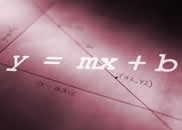Algebra Tutors

Understanding the concepts of algebra is a basic requirement of all students in school. Every high school standardized test, college entrance exam, and graduation requirement mandates a certain level of knowledge in mathematics to be achieved. Any upper level math course is built on the basic foundations that a student learns in their algebra classes. Any student struggling in these preliminary courses should acquire the services of a qualified tutor immediately. We have expert math tutors that can assist students in any of the following algebra courses:
Pre-algebra - The goal of Pre-algebra is to develop fluency with rational numbers and proportional relationships. Students will: extend their elementary skills and begin to learn algebra concepts that serve as a transition into formal Algebra and Geometry; learn to think flexibly about relationships among fractions, decimals, and percents; learn to recognize and generate equivalent expressions and solve single-variable equations and inequalities; investigate and explore mathematical ideas and develop multiple strategies for analyzing complex situations; analyze situations verbally, numerically, graphically, and symbolically; and apply mathematical skills and make meaningful connections to life's experiences.
Algebra I - The main goal of Algebra is to develop fluency in working with linear equations. Students will: extend their experiences with tables, graphs, and equations and solve linear equations and inequalities and systems of linear equations and inequalities; extend their knowledge of the number system to include irrational numbers; generate equivalent expressions and use formulas; simplify polynomials and begin to study quadratic relationships; and use technology and models to investigate and explore mathematical ideas and relationships and develop multiple strategies for analyzing complex situations.
Algebra II - A primary goal of Algebra II is for students to conceptualize, analyze, and identify relationships among functions. Students will: develop proficiency in analyzing and solving quadratic functions using complex numbers; investigate and make conjectures about absolute value, radical, exponential, logarithmic and sine and cosine functions algebraically, numerically, and graphically, with and without technology; extend their algebraic skills to compute with rational expressions and rational exponents; work with and build an understanding of complex numbers and systems of equations and inequalities; analyze statistical data and apply concepts of probability using permutations and combinations; and use technology such as graphing calculators.
College Algebra – Topics for this course include basic concepts of algebra; linear, quadratic, rational, radical, logarithmic, exponential, and absolute value equations; equations reducible to quadratic form; linear, polynomial, rational, and absolute value inequalities, and complex number system; graphs of linear, polynomial, exponential, logarithmic, rational, and absolute value functions; conic sections; inverse functions; operations and compositions of functions; systems of equations; sequences and series; and the binomial theorem.
No matter the level of the algebra course that the student is taking, we have expert tutors available and ready to help. All of our algebra tutors have a degree in mathematics, science, or a related field (like accounting). We are so confident in our algebra tutors that you can meet with them for free. Just ask your tutoring coordinator about our Meet and Greet program.
Elementary Tutors
Elementary school is the beginning of your child's education, where a life long love of learning should be fostered. The basic skills and study habits your child gains in elementary school are the tools that will carry him or her throughout life. Elementary students learn about reading, math, writing, spelling, science, social studies, music, art, computers, and physical education. Elementary school should be a positive, nurturing environment where children are introduced to learning.
Denver Tutors
Results-oriented and compassionate Denver tutors are available now to help your child reach his or her full potential. We know that parents know their child best, so we work with you to insure the tutoring is enjoyable and efficient.
Our highly customized service means that you determine exactly who your tutor will be, where the tutoring will take place, and for how long. We have been providing tutoring services to Denver students for many, many successful years. Our reputation as a premium service is evident in the hundreds of testimonials we have received from parents, students, and schools across the Mile High city.
Our Tutoring Service
We believe that the most effective tutoring occurs when you have the undivided attention of a highly qualified and experienced tutor by your side. Our exceptional tutors are not only experienced and educated, but are experts in their field and passionate about teaching others. We will always provide you with a tutor specifically qualified and experienced in the subject matter you need. And for your peace of mind, we conduct a nation-wide criminal background check, sexual predator check and social security verification on every single tutor we offer you. Before you invest money and time into tutoring sessions, be sure you have selected the right tutor for you.